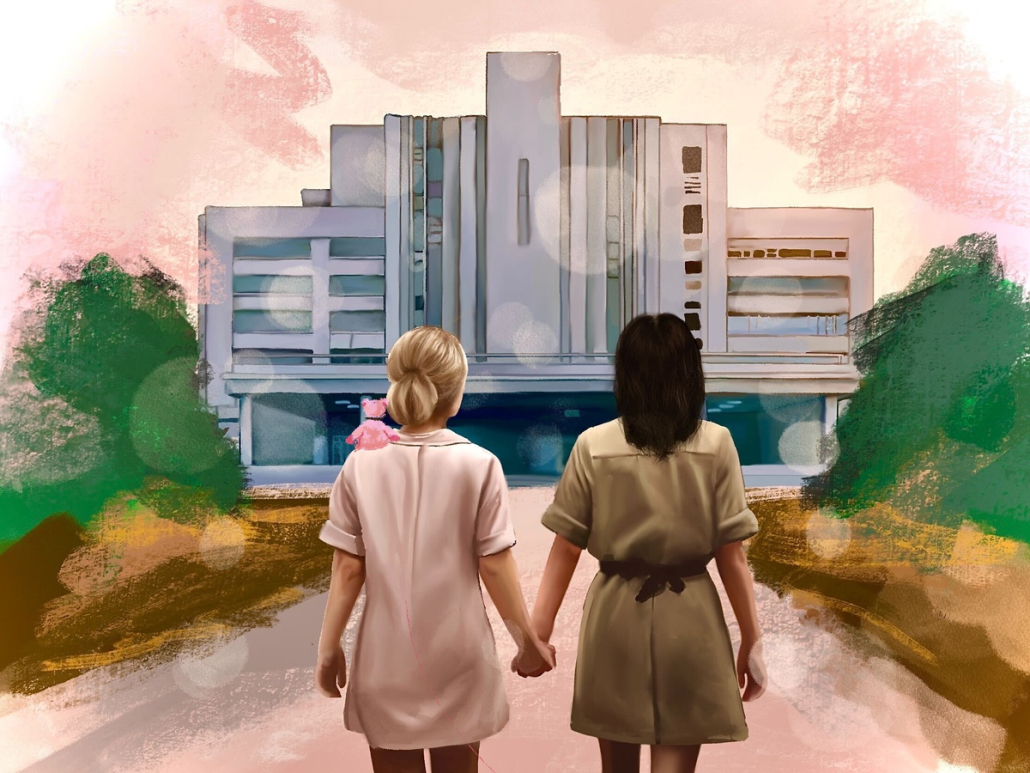Chronically Catherine: Knowing your healthcare rights as a young adult is vital

Content warning: This article contains references to sexual assault and violence.
Catherine Ames: In this installment of Chronically Catherine, you’re getting two Catherines for the price of one (literally what could be better).
The week before graduation, I caught up with my good friend Katherine (what an incredible name) about our mental and physical health post-finals, and she shared something troubling.
Kate McQuarrie: After waiting months for an appointment with a gastrointestinal specialist at a prestigious Los Angeles hospital, I was excited by the prospect of an end to my debilitating symptoms.
But the appointment couldn’t have started worse. The doctor guilt-tripped me for missing a previous appointment, which was an honest mistake, and berated me for not remembering details of a procedure I had undergone as a child.
I was already uncomfortable when he asked the question I dread every time I see a new doctor: “Have you ever experienced trauma or abuse?”
I answered that, yes, I was assaulted when I was 15. His response, verbatim, was: “Was it a ‘you said no, but he heard yes’ type of situation?”
Choking back tears, I asked him why he would possibly need to know that information. I couldn’t believe that a doctor had the nerve to ask for the personal details of my assault, let alone to phrase it in such an offensive way.
He confidently concluded that my GI issues were caused by post-traumatic stress disorder, despite my protest that I’d never been diagnosed with PTSD by any mental health professionals. He left me without a treatment plan or a path forward, having a panic attack in my car and crying on the phone to my mom.
CA: I think we can all agree this never should’ve happened. However, I told Kate that, unfortunately, I wasn’t surprised. I’ve had similar experiences with doctors, specifically where I felt that I received biased treatment because of my age and gender.
One time, I asked a doctor if a new medication he was proposing would affect my fertility long-term and he responded, “Oh, I didn’t know you wanted to have kids. Yeah, this could really harm your fertility.” “Glad I asked!” I wanted to sarcastically reply.
Another time a doctor asked if I was having a lupus flare because of “boyfriend problems.”
KM: As a young adult in the United States healthcare system, seeing doctors and managing healthcare on my own for the first time is overwhelming. It has taken me years to know what to ask, and I still didn’t know what to do when I was treated poorly. It doesn’t help that doctors still treat me like a child.
CA: Meaningful conversations around health equity are finally happening, like the implementation of trauma-informed care, narrative medicine, shared-decision making, and a few emerging transitional care clinics for adolescents and young adults. Yet, it seems like there’s little focus on the members of the AYA population who have unique needs.
Peer-reviewed research from the “Children’s Health Care” journal reveals that if AYAs’ care is mismanaged from a young age, it results in medical mistrust and poorer health outcomes long term. This medical mistrust can manifest in nonadherence to treatment, lack of pursuing follow-up care and a need for such fierce self-advocacy that going to the doctor becomes an emotional burden.
If AYAs aren’t empowered early on with the skills to navigate our healthcare system, how can we expect them to engage in it? At a stage in life filled with major transitions, like puberty, college and the beginning of self-exploration, knowing your rights as a patient makes a major difference in your healthcare — and Kate has some tips.
KM: As a patient, you always have the right to be treated respectfully and have everything explained to you — including treatment, diagnoses and alternative options. If you have a question, ask it. And if a doctor asks you a question you think is odd, you can ask why they need to know that or opt not to answer.
Did you know you can even request a different doctor altogether, or one based on identity characteristics? This is commonly exercised with regard to gender — studies have shown that doctors who identify as women take a more psychosocial approach and spend more time talking to their patients, something I have personally experienced.
You also have the right to file a complaint against a doctor — after asking another doctor what to do, I exercised this right with the GI specialist I mentioned above. Importantly, patients may request to have a third person in the room for any procedure or examination, in addition to a family member, friend or advocate. You can even request an attending doctor to work with you or perform a procedure, rather than a resident or intern.
If you want to read more about your rights, the American Medical Association has a code of patient rights and any hospital or physician’s office should too. Sometimes this code is necessary to bring up to make sure your specific concerns are addressed.
CA: All that said, young adults are just that — adults. I am the expert of my body, my wants, and I know my health goals best. Doctors have invaluable knowledge, but sometimes the perceived doctor-patient hierarchy convinces me that I can’t disagree with them.
Over many years, I’ve come to realize that being young gives me a bit of a sneaky excuse to be loud, state my needs and ask hard questions. Now I’m comfortable asking doctors to slow down and listen. Although doctors do take an oath to do no harm, knowing your patient rights is an important safeguard toward ensuring a healing, not harmful, doctor’s visit.
Writer’s note: Feel free to reach out to Chronically Catherine if you’re also a student with a disability working to coexist with daily adversity without losing sight of your fabulosity — [email protected] or @itschronicallycatherine on Instagram.
Catherine Ames is a newly graduated senior writing about life as a young person coexisting with chronic illness in her column, “Chronically Catherine.”
If you are in need of support, here are some resources you can contact:
USC Relationship and Sexual Violence Prevention and Services: Located at Engemann Student Health Center Suite 356. Individuals can call (213)-740-9355 and request to speak with an advocate or counselor. Services are confidential.
Rape, Abuse & Incest National Network (RAINN): A free, confidential hotline that is active 24/7. Individuals can call (800)-656-4673.

